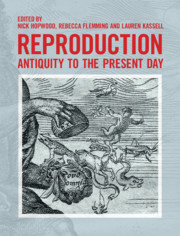Book contents
- Reproduction
- Frontispiece
- Reproduction
- Copyright page
- Dedication
- Contents
- Exhibits
- Illustrations
- Notes on the Frontispieces
- Contributors
- Acknowledgements
- Introduction
- Part I Inventing Generation
- Part II Generation Reborn and Reformed
- Part III Inventing Reproduction
- 20 The Keywords ‘Generation’ and ‘Reproduction’
- 21 Linnaeus and the Love Lives of Plants
- 22 Man-Midwifery Revisited
- 23 Biopolitics and the Invention of Population
- 24 Marriage and Fertility in Different Household Systems
- 25 Colonialism and the Emergence of Racial Theories
- 26 Talking Origins
- Part IV Modern Reproduction
- Part V Reproduction Centre Stage
- Epilogue
- Exhibits
- Select Bibliography
- Index
20 - The Keywords ‘Generation’ and ‘Reproduction’
from Part III - Inventing Reproduction
Published online by Cambridge University Press: 16 November 2018
- Reproduction
- Frontispiece
- Reproduction
- Copyright page
- Dedication
- Contents
- Exhibits
- Illustrations
- Notes on the Frontispieces
- Contributors
- Acknowledgements
- Introduction
- Part I Inventing Generation
- Part II Generation Reborn and Reformed
- Part III Inventing Reproduction
- 20 The Keywords ‘Generation’ and ‘Reproduction’
- 21 Linnaeus and the Love Lives of Plants
- 22 Man-Midwifery Revisited
- 23 Biopolitics and the Invention of Population
- 24 Marriage and Fertility in Different Household Systems
- 25 Colonialism and the Emergence of Racial Theories
- 26 Talking Origins
- Part IV Modern Reproduction
- Part V Reproduction Centre Stage
- Epilogue
- Exhibits
- Select Bibliography
- Index
Summary
- Type
- Chapter
- Information
- ReproductionAntiquity to the Present Day, pp. 287 - 304Publisher: Cambridge University PressPrint publication year: 2018
- 7
- Cited by



